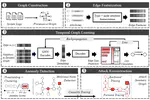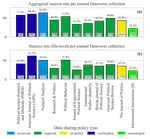Biography
Thomas Pasquier is an Assistant Professor in the Department of Computer Science at the University of British Columbia. He is affiliated with the UBC Security & Privacy Group and the Systopia Lab, UBC’s systems research group. His work focuses on the design and implementation of computer systems that are inherently observable and transparent. His research interests include digital provenance, system auditing and accountability, intrusion detection, and performance optimization.
Thomas Pasquier est professeur adjoint au Département d’informatique de l’Université de la Colombie-Britannique (UBC). Il est affilié au Security & Privacy Group de l’UBC et au Systopia Lab, le groupe de recherche en systèmes de l’UBC. Ses travaux portent sur la conception et la mise en oeuvre de systèmes informatiques intrinsèquement observables et transparents. Ses intérêts de recherche incluent la provenance numérique, l’audit et la responsabilité des systèmes, la détection d’intrusion et l’optimisation des performances.
- Computer Security
- Intrusion Detection
- Digital Provenance
- Operating Systems
- Distributed Systems
- Data Protection and Privacy
-
PhD in Computer Science, 2016
University of Cambridge
-
MPhil in Advanced Computer Science, 2012
University of Cambridge
-
Diplôme d'Ingénieur (apprenticeship), 2011
Institut Supérieur d'Electronique de Paris
-
Diplôme Universitaire de Technologie (apprenticeship), 2008
Conservatoire National des Arts et Métiers
Experience
Joining my lab
Contacting me
If you are planning to apply, please, do so through the UBC system, if you select me as a potential supervisor in the online form, I will review your application. I cannot process applications sent via e-mail and I will not review application packages sent by e-mail. I do not process applications before the closing deadline (December 15th). The department receive around 2,000 applications every year and it takes a non-trivial amount of time to review them carefully. We aim (but cannot guarantee) for all applicants to hear back from us by mid-April. I will not discuss admission outside of the departmental admission process.
Please feel free to contact me if you have specific research questions.
I am looking to work with students from all background (first generation students, and students from underrepresented and marginalized groups are encouraged to apply). Please, visit the prospective applicant page on UBC website and on the CS website. You can also find information about: financial support, application fee waivers, minimum requirements for admission into graduate studies, and minimum English proficiency requirements. You may also look at this page which describes my expectations when working with graduate students. Finally, you should have a look at UBC cost calculator.
A few facts
- You must apply online.
- Do check the application deadline on UBC’s website.
- The department starts processing applications in January for the next academic year.
- Students are admitted by the department, not by individual faculty members.
- Master and PhD applications are reviewed by the same committee. The PhD track is ideal for candidates who ultimately want to do a PhD, but do not feel ready yet.
- Even if you are well fitted for my group, I cannot guarantee admission.
Before applying
- Have a look at my publications.
- Understand the many roles of a PhD advisor.
- Identify matching interests.
- Understand that I will not supervise students outside of my area of expertise.
- Find a set of papers which aligns with your interests.
- Read the abstracts.
- Read at least one paper in full.
What to address in your statement of intent?
- Start with the official guidance. Review the department website for any required information, length limits, or formatting.
- Cover three essentials. Demonstrate you understand research; describe the research you have done; outline the research you want to pursue.
- Mention funding. Briefly note scholarships you hold or plan to apply for.
- Stay focused. The SoI is not your life story; prioritize intellectual trajectory, evidence of research ability, and where the degree fits in your career plans.
- Emphasize advisor fit. The advisor–student relationship is crucial and often lasts for years. Your SoI should make the commonality of interests obvious.
- Be selective about potential advisors. Listing many names across unrelated areas usually weakens your case. If you are considering co-supervision explain the intellectual thread that links advisors.
- Make the match explicit. Clearly connect specific faculty to your past experience and future aims: why this lab, why now, and what you would contribute.
- All else equal, specificity wins. Applicants who can articulate why a particular advisor and research direction are the right fit are more likely to be successful.
- These points reflect my personal perspective and may not be universally true.
If you get an offer letter
- Do not hesistate to get in touch to discuss specific details.
- Funding amounts on the offer letter is a guaranteed minimum, do contact me to discuss the actual amount.
- Apply for graduate accomodation as early as possible. Check the information online.
Selected Publications
Recent Publications
Teaching
| UBC | ||
|---|---|---|
| CPSC 538P: Introduction to Research in Security & Privacy | 2025-2026 | Winter 2 (January) |
| CPSC 313: Computer Hardware and Operating Systems | 2025-2026 | Winter 1 (September) |
| CPSC 538P: Topic in Computer Systems: Systems Security | 2024-2025 | Winter 2 (January) |
| CPSC 436A: Operating Systems Design and Implementation | 2024-2025 | Winter 1 (September) |
| CPSC 538S: Accountable Computer Systems | 2023-2024 | Winter 2 (January) |
| CPSC 436A: Operating Systems Design and Implementation | 2023-2024 | Winter 1 (September) |
| CPSC 538P: Topic in Computer Systems: Systems Security | 2022-2023 | Winter 2 (January) |
| CPSC 436A: Operating Systems Design and Implementation | 2022-2023 | Winter 1 (September) |
| Bristol | ||
|---|---|---|
| COMS20012: Computer Systems B (Operating Systems & Security) | 2020-2021 | TB2 (January) |
| COMSM0050: Systems and Software Security | 2020-2021 | TB1 (September) |
| COMSM1500: Systems Security | 2019-2020 | TB1 (September) |
| COMSM1500: Systems Security | 2018-2019 | TB1 (September) |
Service
Program Committee
- ACM ASPLOS 2021 (ERC), 2025, 2026
- ACM EuroSys 2020, 2023, 2025, 2026
- USENIX Security 2024, 2025
- ACM REP 2023, 2024
- ACM CCS 2022, 2023
- ACM SOSP 2023
- ACM SoCC 2023
- IEEE EuroS&P 2023
- ACM/IFIP Middleware 2023
- IEEE IC2E 2021, 2022
- ACM M4IoT 2016, 2017, 2018, 2019, 2020, 2021
- USENIX TaPP 2017, 2019, 2024
- IEEE CLAW 2016, 2017, 2018
Reviewer/External
- ACM CCS 2020
Organization
Students & Postdocs
Current Students and Postdocs
- Tristan Bilot (Postdoc, UBC)
- Soo Yee Lim (PhD student, UBC)
- Xuechun Cao (PhD student, UBC)
- Cathy Liu, (MSc Student, UBC)
Past students and position held after graduation
- Tanya Prasad (MSc student, UBC), 2025, Software Engineer, Amazon AWS.
- Baoxiang Jiang (Visiting PhD Student, Xi’an Jiaotong University), 2025.
- Tristan Bilot (Visiting PhD Student, Université Paris-Saclay), 2024.
- Nichole Boufford (MSc student, UBC), 2024, Software Developer, Oracle Labs.
- Jinyuan Liang (MSc student, UBC), 2024, Security Analyst, WeBank.
- Haley Li (MSc student, UBC), 2024, co-supervised with Mathias Lécuyer, Research Engineer, Huawei Canada.
- Wellison Raul Mariz Santos, (Visiting PhD Student, UFPE) 2024, Researcher and Professor, CISSA/CESAR.
- Mayank Tiwary (MSc student, UBC), 2023, co-supervised with Ivan Beschastnikh, Senior Member of Technical Staff, Salesforce.
- Bogdan Stelea (MEng, Bristol), 2021, Software Engineer, Amazon.
- Josh Turner (MEng, Bristol), 2021, Software Engineer, Amiosec.
- Chetankumar Mistry (MEng, Bristol), 2020, Software Engineer, ARM.
- Xiaoxiao Wu (MSc, Bristol), 2020, Consultant, Deloitte.
- Yangyang Teng (MSc, Bristol), 2019, Data Analyst, Bloomberg.
- Ziying Shao (BSc, Bristol), 2019, UG Researcher, Beijing Institute of Big Data Research.
Contact
- tfjmp@cs.ubc.ca
- Office 301, 2366 Main Mall, Vancouver, British Columbia V6T 1Z4
- DM Me





